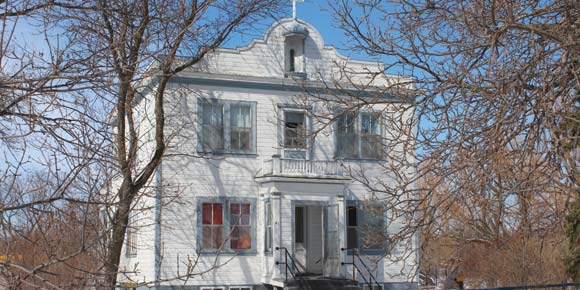Located 30 kilometres south of Winnipeg on the banks of the La Salle River, the community of La Salle is the largest urban centre in the Rural Municipality of Macdonald. According to the 2016 census it had a population of 1,589 people, up four per cent from 2011, though its trading area is closer to 2,500 people.
In recent years, La Salle has been bustling with residential construction activity. With its growing stock of newly-built suburban homes, tidy commercial buildings and a modern school, one might think that this is a recently-created bedroom community. It is, however, steeped in history, though you need to look up at its tallest structures to tell its story.
St. Hyacinthe Roman Catholic Parish, 27 rue Beaudry
In 1882, the arrival of the CPR meant the establishment of a formal settlement at this site. Around the same time, Archbishop Alexandre-Antonin Taché of St. Boniface acquired 160 acres of adjacent land on which to establish a seminary and new parish. The church’s role as a major landowner helped attract many Francophone Catholic settlers from Quebec to the area.
The parish of St. Hyacinthe de La Salle was created in 1890 under Father Charles Agapit Beaudry from the diocese of St. Hyacinthe in Quebec.
The current church building was constructed in 1915 at a cost of $30,000. It is in the Romanesque Revival style, notable for its rounded window arches and decorative brickwork with stone accents. The gleaming bell tower which once held three bells, is 38 metres tall.
Little expense was spared in outfitting the church’s interior. It is said that around $4,000, nearly $90,000 in today’s dollars, was spent on furnishings and artwork.
The St. Hyacinthe Roman Catholic Parish continues to worship every Sunday.
Paterson Grain Elevator, 42 rue Degagne
The life blood of any rural community was its elevator and for a brief time La Salle had three of them.
The first elevator was constructed circa 1900 by Moise Cormier, a local grain merchant who, according to his obituary, was the area’s largest landowner with 6,000 acres to his credit. Like many of La Salle’s early settlers he came from Quebec, arriving in 1893 with his wife and seven sons.
Within just a few years, Cormier’s elevator was joined along the tracks by Ogilvie Flour Mills and the Imperial Elevator Company.
Imperial’s elevator burned down in 1907. Though the manager was inside his office at the time, he escaped unhurt and the fire was prevented from spreading to other structures. The company decided not to rebuild. Ogilvy dismantled their elevator in 1911 so that it could be moved to another community.
After Cormier’s death in 1915, the family sold what was once again the only elevator in La Salle to the N. M. Paterson Grain Company.
In 1938, Paterson built the current elevator. It has been expanded over the decades, including a renovation to the office area and the addition of steel storage bins in the 1980s. According to the Canadian Grains Commission the La Salle elevator has a capacity of 4,005 metric tons.
Eighty years later, the elevator is still owned by Paterson and served by C. P. Rail.
Former convent of the Filles de la Croix
(Sisters of the Cross)
41 rue Beaudry
Anxious to offer religious education in the community, area residents appealed to the Sisters of the Cross to establish a convent at La Salle. The educational order had been operating in Manitoba for decades with their largest convent and school built at Ste. Adolphe in 1906.
Permission to create the new convent was granted in 1927.
St. Hyacinthe parish donated a piece of land next to their church and $3,000 was raised so that a convent could be erected. The two-storey building contained living quarters for the nuns as well as a small chapel on the main floor. The first superior was Sister Emmanuel.
The local school division built a new school near the convent for the sisters and they originally taught grades one through ten. Through the 1960s the number of grades was reduced to one through six.
A shortage of nuns led the Sisters of the Cross to close the La Salle convent in 1973. Later that year, the building was sold off as a single-family home.
Christian Cassidy writes about local history on his blog, West End Dumplings.



